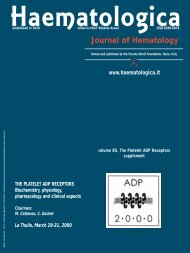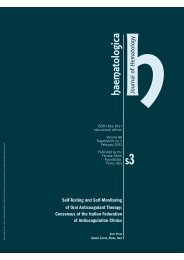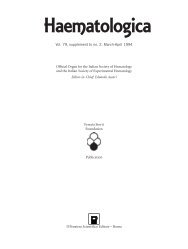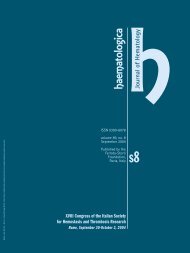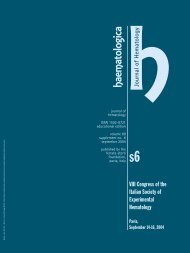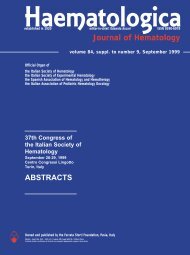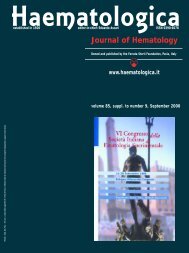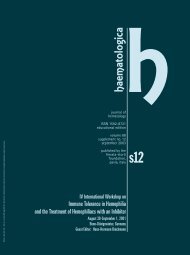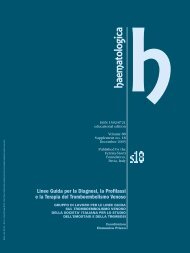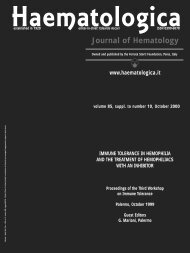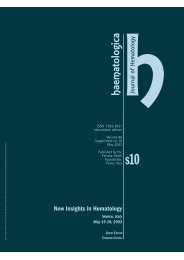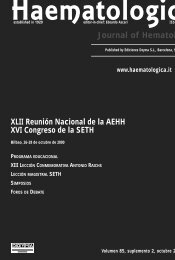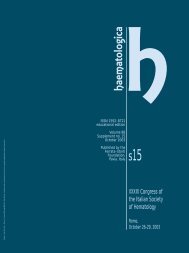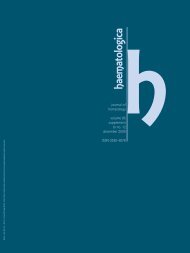- Page 1 and 2:
Focussed Symposia Arsenic trioxide
- Page 3 and 4:
assess whether such a program will
- Page 5 and 6:
The overall response rate was noted
- Page 7 and 8:
Figure 5A Table 1: VEL + THAL for R
- Page 9 and 10:
naturally occurring OPG. Present tr
- Page 11 and 12:
0.505). Finally, the multiple event
- Page 13 and 14:
CLINICOPATHOLOGICAL DEFINITION OF W
- Page 15 and 16:
Plenary Sessions 1. Development of
- Page 17 and 18:
clonotypic IgH VDJ signature confir
- Page 19 and 20:
can be considered as two entities,
- Page 21 and 22:
immunofluorescence staining for DKK
- Page 23 and 24:
P2.3 DEVELOPMENT OF A MULTIPLE MYEL
- Page 25 and 26:
P2.5 MOLECULAR CYTOGENETICS OF MYEL
- Page 27 and 28:
clear that the biggest challenge fo
- Page 29 and 30:
esponse and have demonstrated that
- Page 31 and 32:
variable region of the idiotypic im
- Page 33 and 34:
4. From MGUS to symptomatic MM Fig.
- Page 35 and 36:
(MRI); some have claimed that level
- Page 37 and 38:
P4.5 CYTOKINES IN MGUS: THERAPEUTIC
- Page 39 and 40:
preventing phosphorylation of p70S6
- Page 41 and 42:
transducing component of the interl
- Page 43 and 44:
survive initial drug exposure and a
- Page 45 and 46:
quiescent counterpart, the human um
- Page 47 and 48:
transcriptional activity of NF-êB;
- Page 49 and 50:
manifestations and anomalous protei
- Page 51 and 52:
P7.4 ROLE OF SERUM FREE LIGHT CHAIN
- Page 53 and 54:
P7.6 IMMUNOPHENOTYPIC INVESTIGATION
- Page 55 and 56:
presumably through the circulation,
- Page 57 and 58:
9. Chemotherapy, maintenance treatm
- Page 59 and 60:
stratified according to their antim
- Page 61 and 62:
explore higher doses of zoledronic
- Page 63 and 64:
initial therapy. However, the role
- Page 65 and 66:
P10.2.2 SINGLE VERSUS TANDEM HIGH D
- Page 67 and 68:
With a median follow-up of 38 month
- Page 69 and 70:
cells could be harvested following
- Page 71 and 72:
11. What is the role of allogeneic
- Page 73 and 74:
found that 75% of patients who were
- Page 75 and 76:
patients with responsive disease 3
- Page 77 and 78:
9. Giralt S, Estey E, Albitar M, et
- Page 79 and 80:
Badros A, Barlogie B, Siegel E, et
- Page 81 and 82:
Figure 3b. Event-free Survival 4-Ye
- Page 83 and 84:
improve patient outcome in MM. Impo
- Page 85 and 86:
myeloma and in 40% of previously un
- Page 87 and 88:
degrade OPG in the same way as myel
- Page 89 and 90:
P12.2.5 MONOCLONAL ANTIBODY THERAPY
- Page 91 and 92:
myeloma. Blood 2001; 98:210-216. 6.
- Page 93 and 94:
MHC molecules, in effectively prese
- Page 95 and 96:
mice demonstrate that class II-spec
- Page 97 and 98:
detected in 293 and NIH3T3 cells. S
- Page 99 and 100:
hypothesis that (1) CCND1 and FGFR3
- Page 101 and 102:
patient samples. In addition, the p
- Page 103 and 104:
016 NEUTRAL ENDOPEPTIDASE (CD10) KN
- Page 105 and 106:
2. Genetic heterogeneity in MM: imp
- Page 107 and 108:
evidence from two t(11;14) cases wh
- Page 109 and 110:
immunoglobulin heavy chain (IgH) lo
- Page 111 and 112:
034 Instability of Pericentromeric
- Page 113 and 114:
clusters were found, the first was
- Page 115 and 116:
MGUS but most likely not crucial fo
- Page 117 and 118:
Objective: To compare the impact on
- Page 119 and 120:
4 patients had MMSET/IgH but did no
- Page 121 and 122:
and clonal PC from MGUS, MM and PCL
- Page 123 and 124:
059 VEGF receptor expresion in Mult
- Page 125 and 126:
two HLA-A2+ myeloma patients with C
- Page 127 and 128:
molecules expressed on the surface
- Page 129 and 130:
Recognition of these antigens appea
- Page 131 and 132:
Diagnosis requires a single area of
- Page 133 and 134:
081 Incidence of solid tumors in co
- Page 135 and 136:
Growth Factor (VEGF), Hepatocyte Gr
- Page 137 and 138:
PC-AI levels of MGUS and SMM patien
- Page 139 and 140:
093 The predominant pathway of tran
- Page 141 and 142:
was associated with I.V. line, whil
- Page 143 and 144:
103 Vascular amyloidosis induces se
- Page 145 and 146:
5. Signal transduction pathways and
- Page 147 and 148:
integrin in IGF-1-triggered MM cell
- Page 149 and 150:
118 IL-6- Induced Phosphorylation o
- Page 151 and 152:
123 THE IGF/IGF-1R SYSTEM IS A MAJO
- Page 153 and 154:
human myeloma cell line (HMCL) to a
- Page 155 and 156:
ligation or dexamethasone (Georgii-
- Page 157 and 158:
6. Role of microenvironment 6.1 Cel
- Page 159 and 160:
141 Human myeloma cells adhere to f
- Page 161 and 162:
145 STUDY OF BONE MARROW ANGIOGENES
- Page 163 and 164:
patients, the growth of primary mye
- Page 165 and 166:
tibia (con=49.1±0.7mg/cm2 vs 5T2=4
- Page 167 and 168:
157 The Nitrogen-Containing Bisphos
- Page 169 and 170:
7. New prognostic criteria for clas
- Page 171 and 172:
atio of >3. This system has subdivi
- Page 173 and 174:
Patient 1 (IgG/κ);IgG - 16.5 days,
- Page 175 and 176:
176 Pro-inflammatory and angiogenic
- Page 177 and 178:
180 Clinical study on the bone lesi
- Page 179 and 180:
7.2 Imaging studies 185 99mTc-MIBI
- Page 181 and 182:
189 Factors Predicting Occult Spina
- Page 183 and 184:
vivo detected resonances was invest
- Page 185 and 186:
Support Unit (CTSU) with flexibilit
- Page 187 and 188:
(β2m) & C reactive protein (CRP).
- Page 189 and 190:
plasmids carrying the clonotypic in
- Page 191 and 192:
newly diagnosed multiple myeloma as
- Page 193 and 194:
216 Transgenic expression of Myc an
- Page 195 and 196:
221 Prolonged survival in the 5T2MM
- Page 197 and 198:
9. Chemotherapy, maintenance, treat
- Page 199 and 200:
229 EFFECTIVENESS OF STANDARD CHEMO
- Page 201 and 202:
234 Melphalan and Dexamethasone- Is
- Page 203 and 204:
Methods. We investigated the VECD p
- Page 205 and 206:
9.2 Renal complications. 243 MERIT
- Page 207 and 208:
cost of SRE-related care was $10,24
- Page 209 and 210:
those with Hb >13 g/dL. Analysis of
- Page 211 and 212:
sustained response, lasting from 52
- Page 213 and 214:
proportion of bone abnormality. IgD
- Page 215 and 216:
disease. The lack of response to in
- Page 217 and 218:
yielding a median of 3x106/kg CD34
- Page 219 and 220:
patients(pts) aged ≥60 yrs. We co
- Page 221 and 222:
PBSC mobilizing regimen utilizing C
- Page 223 and 224:
their leukocytes and platelets. No
- Page 225 and 226:
25 Gy to marrow. The tracer dose wa
- Page 227 and 228:
non-CR after the first transplant a
- Page 229 and 230:
296 PERIPHERAL BLOOD STEM CELL TRAN
- Page 231 and 232: References Effect of dose-intensive
- Page 233 and 234: with cyclosporine A and methotrexat
- Page 235 and 236: 11.Role of novel therapies targetin
- Page 237 and 238: 312 Thalidomide as Rescue of Relaps
- Page 239 and 240: patients, light chain in 1 patients
- Page 241 and 242: platelets of 207 (76-402), B2M of 3
- Page 243 and 244: 325 Low Dose Thalidomide plus Dexam
- Page 245 and 246: in 5 pts (11%), M protein decreased
- Page 247 and 248: time from diagnosis was 3.7 years a
- Page 249 and 250: 339 Thalidomide, Clarithromycin and
- Page 251 and 252: 344 COMBINATION OF THALIDOMIDE, DEX
- Page 253 and 254: experienced early death during the
- Page 255 and 256: untreated patients with high tumor
- Page 257 and 258: 357 Thalidomide protects endothelia
- Page 259 and 260: 362 EOSINOPHILIA IS A VERY COMMON F
- Page 261 and 262: 11.5 CC 4047, PS 341 and arsenic tr
- Page 263 and 264: without chromosome 13. Mean IC50 fo
- Page 265 and 266: myeloma patients. Phase I data indi
- Page 267 and 268: 11.6 Other drugs 380 EFFECT OF STI5
- Page 269 and 270: significant inhibition of cell prol
- Page 271 and 272: which acts to prevent the synthesis
- Page 273 and 274: of B and its metabolites, however,
- Page 275 and 276: and 10 months after start of therap
- Page 277 and 278: terminal kinase (JNK) pathway which
- Page 279 and 280: lymphocytes was tested by Ellispot.
- Page 281: 411 Dendritic Cell-Based Idiotype V
- Page 285 and 286: De La Serna J 291 De Laurenzi A P11
- Page 287 and 288: Hull DR 338 Hullen C P10.2.1 Humes
- Page 289 and 290: Morra E 249 280 359 Morris CM 226 M
- Page 291 and 292: Siegel D 70 115 250 Sierra J 304 30



